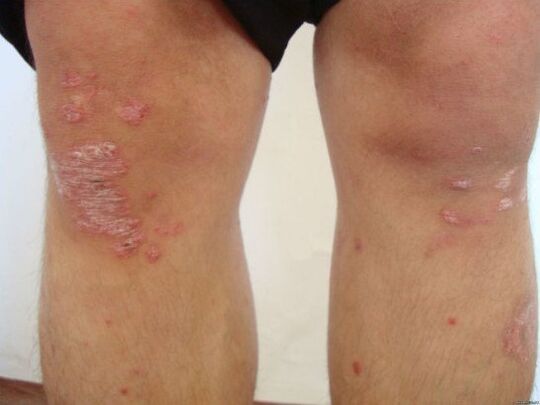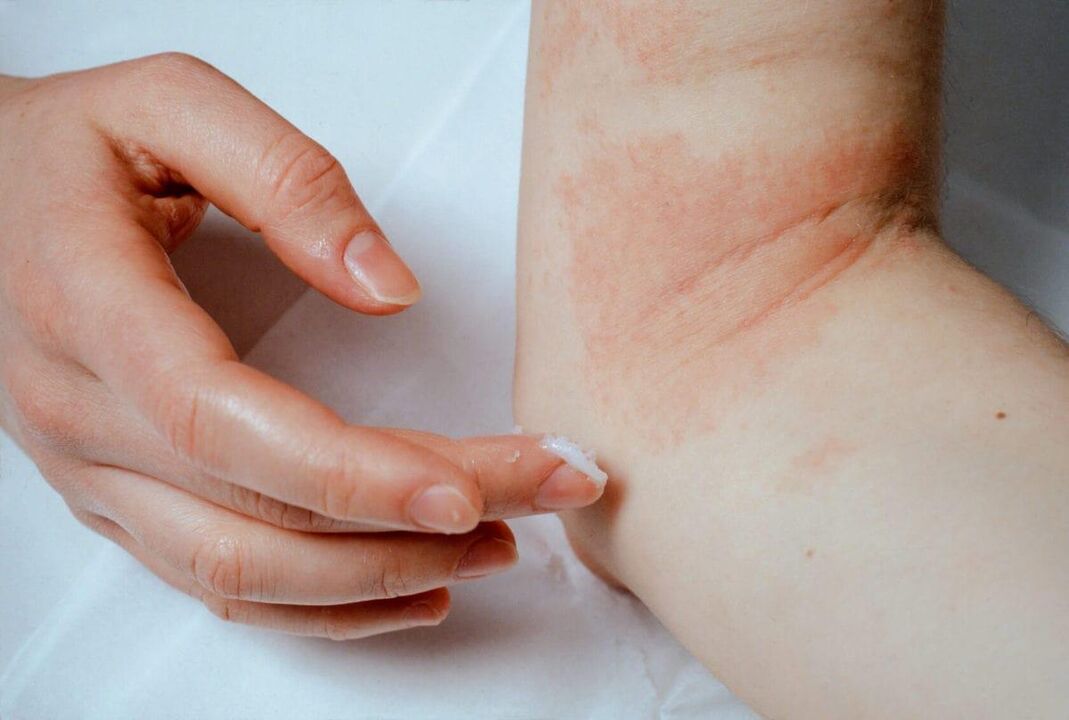Ecoric psoriasis (vulgar) is a chronic skin disease, which is characterized by the appearance of characteristic changes on the skin, a sharp decrease in quality of life due to the appearance of itching and burning skin, but at the same time does not constitute a direct threat to life, while maintaining in most cases throughout the cases.
The first signs of psoriasis in most cases are in childhood or youth, after thirty years, the disease, as a rule, is not manifested.About two percent of the population suffers from this disease, although according to some other data, the figure exceeds 6%, but many cases of light lesson in the disease are simply not recorded.
Causes

Ordinary common psoriasis is a versatile disease, that is to say that it does not occur under the influence of a certain cause, but because of the influence of a large number of factors.It was therefore considered for a long time, until scientists discover that the genetic anomaly is in fact based on the development of the disease.
The violations of the short shoulder of the fifth chromosome are the cause of a change in immune tolerance and under the influence of a certain number of factors, this change may appear in the form of psoriasis.In other words, a genetic anomaly creates a predisposition to the disease, but does not yet guarantee its occurrence.
The factors that can contribute to psoriasis must be called:
- Stress;
- Alcohol and smoking;
- Infectious diseases and chronic infection households;
- Endocrine disorders, mainly diabetes;
- Violations of immune tolerance under the influence of various external factors, including poor ecology.
Symptoms and first signs
Professional psoriasis is the most common form of the disease, we think that 90% of all cases of psoriasis fall under vulgar psoriasis.
Psoriasis of the scalp can take place, but often manifestations are observed precisely on the skin.The first changes appear on the skin of the expanding surface of the elbow and knee joints.Then they can spread from primary foci on the surface of the extensor of the forearm and on the shoulder, chest and back.
The characteristics of rashes are as follows:
- Black spot;
- There is a white plate on the surface (looks like a wax plate);
- The crusts are deleted, but not easy;
- After withdrawing the crusts on the surface of the eruption, a bloody outing appears because the elimination of the crusts hurts the blood vessels.
The rashes for psoriasis are always accompanied by severe itching, sometimes so pronounced that, because of this, night sleep is disturbed, which leads to pronounced negative emotions and to the regime and to altered rest.Work capacity is considerably reduced, within the framework of which psoriasis without treatment can cause disability.
Ordinary psoriasis in children
In some cases, ordinary psoriasis in children can manifest itself at age very early, in this case, characteristic clinical manifestations appear, and standard treatment is difficult due to the negative effect of drugs on other organs and systems.
However, ordinary or any other psoriasis in early childhood does not develop practically, in most cases, the disease develops in adolescence and, in previous years, it can imitate much more common atopic dermatitis.However, when changes appear on the skin, it is always necessary to consult a doctor as soon as possible to examine and form a precise diagnosis.
Diagnostic measures
In most cases, the diagnosis of ordinary psoriasis does not cause great difficulties.The characteristic clinical signs make it possible to suspect the presence of the disease, a positive symptom confirms the hypotheses, but to make a final diagnosis, it is used to make a biopsy of the skin zone covered with rashes, where histological changes in the dermis are detected by the disease.
With what can you confuse?
Despite the presence of a characteristic clinical picture, it is not always possible to make a diagnosis only during the examination, in some cases, it is necessary to differentiate the disease with:
- Seborrheic eczema;
- Red flat lichen;
- Neurodermatitis;
- Atopic dermatitis.
The most effective method for conducting a differential diagnosis is a biopsy of the skin area.The detection of changes characteristic of psoriasis in the skin makes it possible to check the diagnosis.
Psoriasis treatment
If there was only one effective treatment pattern of psoriasis, then, probably all patients could easily get rid of the manifestations of the disease and considerably improve the quality of life, but there are a certain number of problems in the therapy of this disease, among them, it must be called:
- Refusal of patients with a light and moderate course;
- The difficulty of dealing with the situation in a serious course of the disease;
- High cost of effective treatment methods;
- The need for individual therapy selection in order to achieve the desired result.
Psoriasis therapy should include not only treatment with systemic and local drugs, but also the use of physiotherapeutic techniques (good performance demonstrates power therapy), as well as compliance with a diet and a change in lifestyle (rejection of bad habits, limiting psychological stress).
Among the system and local drugs are the most widely used:
- Cytostatic;
- Monoclonal antibodies;
- Cells t of immunity;
- Glucocorticoids;
- Anti-inflammatory nails based on salicylic acid.
The selection of specific drugs, the determination of their compatibility and the possibility of use (depending on the presence of a concomitant pathology) is determined exclusively by the doctor after a complete examination.In any case, in no case can correspondence recommendations be given to increase the efficiency of the treatment.
How to treat psoriasis at home

The development of psoriasis is based on immune factors, a violation of tolerance due to the genetic anomaly leads to the development of these changes in the skin, which are the cause of the appearance of corresponding symptoms.
It is not surprising that traditional medicine implies the use of various recipes based on herbs, leaves and plant roots that have immunomodulation properties.It is believed that the immunomodulating effect can reduce the severity of manifestations.
But many herbs that are recommended to use (calendula, chamomile, etc.) rather have immunostimulant properties.Activation of immunity in psoriasis can cause worsening the disease and only an increase in the severity of symptoms.
This is why in no case should you use self-medication with herbs and other folk remedies for psoriasis, and if certain methods can be used, then only in addition to the main therapy and only under the strict control of the doctor after a complete examination.
If during treatment the appearance of new rashes, increased severity of symptoms, the worsening of burns and itching are noticed, such therapy must be stopped immediately, because it can represent a direct danger to your health.
Do they take the army with psoriasis?
Psoriasis is the disease in which a temporary delay in military service is given or a conscript is recognized as without value for military service.In serious forms of the disease, when large areas of skin are affected, there are joint lesions, the general state suffers considerably - they do not take in the army.
If we are talking about limited and easy -to -treat forms, then a temporary delay in the army can be given with them, after treatment, a medical commission is reprimanded, which recognizes the conscript adapted to the service or exempt.
It is believed that psoriasis is a contraindication for the service, however, in some cases, a medical commission can be made by another decision, therefore, the final answer to this question gives a medical commission after having evaluated the general condition, the degree of seriousness of the disease and other factors.The actions of doctors are regulated by the relevant instructions according to which the conscript must be assigned to one of the categories (from A to D) in accordance with which a temporary or constant exemption of the service is given.
Prevention of psoriasis development
Is it possible to perform effective prevention of psoriasis?The rhetorical question, which is not unambiguous.The fact is that all factors contributing to the development of the disease can lead to psoriasis, because it is considered today, only in the presence of a genetic anomaly which cannot be influenced.
Naturally, prevention in most cases is not carried out, because neither the patient himself or no one knows the presence of predisposition.Exceptions are only cases where parents suffer from psoriasis, and this fact can be assessed as a high risk of developing the disease in the patient himself.
The measures to prevent the development of the disease must include:
- The maximum restriction of all stressful influences and psychological stress is not always able to do so, but it is recommended to limit the psycho-emotional load;
- Perform a timely and complete treatment of infectious households and the sanitation of chronic infection households (recommended not only in order to prevent psoriasis, but also others, including autoimmune diseases);
- Rejection of bad habits, compliance with the work and rest regime, appropriate nutrition;
- Appropriate treatment of concomitant diseases, mainly - endocrine pathology;
- Protection against ultraviolet rays (restriction of the stay under direct sunlight, use of sunscreen creams).
Measures for the prevention of ordinary psoriasis are not strictly specific, and the main difficulty in their practical use is that it is practically impossible to carry out primary prevention due to ignorance of the potential risk, secondary prevention is important in terms of the prevention of the progression of the disease, but it does not help to eliminate existing changes.
Forecasts for life and recovery

With psoriasis, life forecasts are favorable, but for recovery - unfavorable.This disease does not lead to the development of complications threatening life and is not the cause of the death of patients, but considerably reduces the quality of life.
The use of any approach and treatment methods does not allow you to completely get rid of the disease, so the recovery prognosis is unfavorable.Therapy should aim to reduce the severity of the symptoms and prolong the period of remission.With appropriate treatment, it is possible to obtain an almost complete disappearance of rashes and considerably reduce the frequency of exacerbations.























